Best Summer Math
Camp in Boston & Silicon Valley.
Silicon Valley: 2026 (Dates TBA)
9-18 for day students.
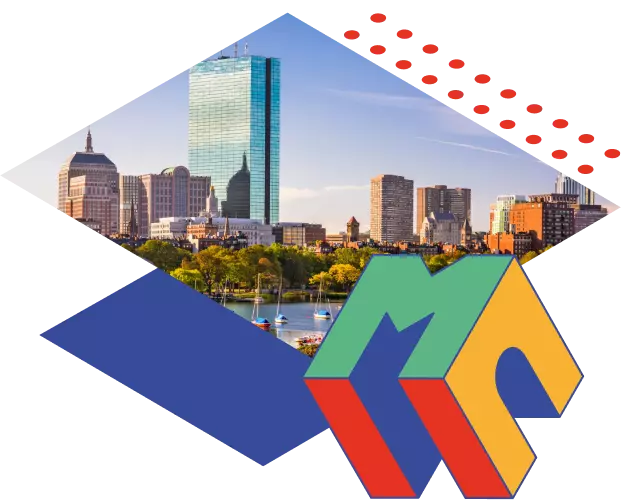
Why Choose CyberMath’s Best Summer Math Camp?
- Expert Faculty: Learn from IMO medalists and AI researchers from prestigious academic institutions – at prestigious academic venues in both locations. Meet Our Instructors.
- Unique Curriculum: Focus on reasoning, proof-writing, real-world applications, and hands-on AI & ML projects – delivered at prestigious academic venues. Explore Courses.
- Fun Activities: Historic city tours (Boston) or tech innovation walks (Silicon Valley) – all near your prestigious academic venue.
We offer two main programs tailored to different age groups:
- Advanced Middle School Math: Recommended for advanced 4th, 5th, 6th, 7th, and 8th graders.
- Advanced High School Math: Recommended for advanced 9th, 10th, 11th, and 12th graders.
Learn more about our courses in our Course Catalog.
CyberMath Academy’s Summer Math Camp in Boston, MA is a selective summer program for students who would like to sharpen their math skills in the inspiring and motivating atmosphere of an Ivy League College. Our math camp provides a challenging environment in summer for students in which they master mathematics with the participation of brilliant students from all over the globe.
Advanced Middle School Math (recommended for advanced 4th, 5th, 6th, 7th and 8th graders)
Advanced High School Math (recommended for advanced 9th, 10th, 11th and 12th graders)
Please visit our course catalog for more information on our courses!

Please see our faculty page for our instructors. Summer Math Camp instructors will be some of the instructors listed on our faculty page or other outstanding teachers with similar credentials.

Prestigious University Campus Tours and innovation lab visits are scheduled each year.
We will visit the historical places to see first-hand where the United States was founded and learn about its history. Walk along The Freedom Trail, try many tastes at Quincy Market, and when tired of walking hop on a Duck Tour to see the city from the river. Feel the vibrant energy of Boston’s most famous university districts and take a walk along the beautiful Charles River.
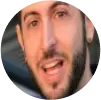
“Hybrid Human-Machine Information Systems”
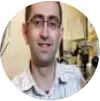
College. Studying towards PhD in Business at
Stanford Univ.

Learning Department, Former
Researcher at Harvard Medical School

Biosciences Institute “Mechanical Engineering
and Neuroscience”

Interdisciplinary Biosciences Institute
“BioRobotics”
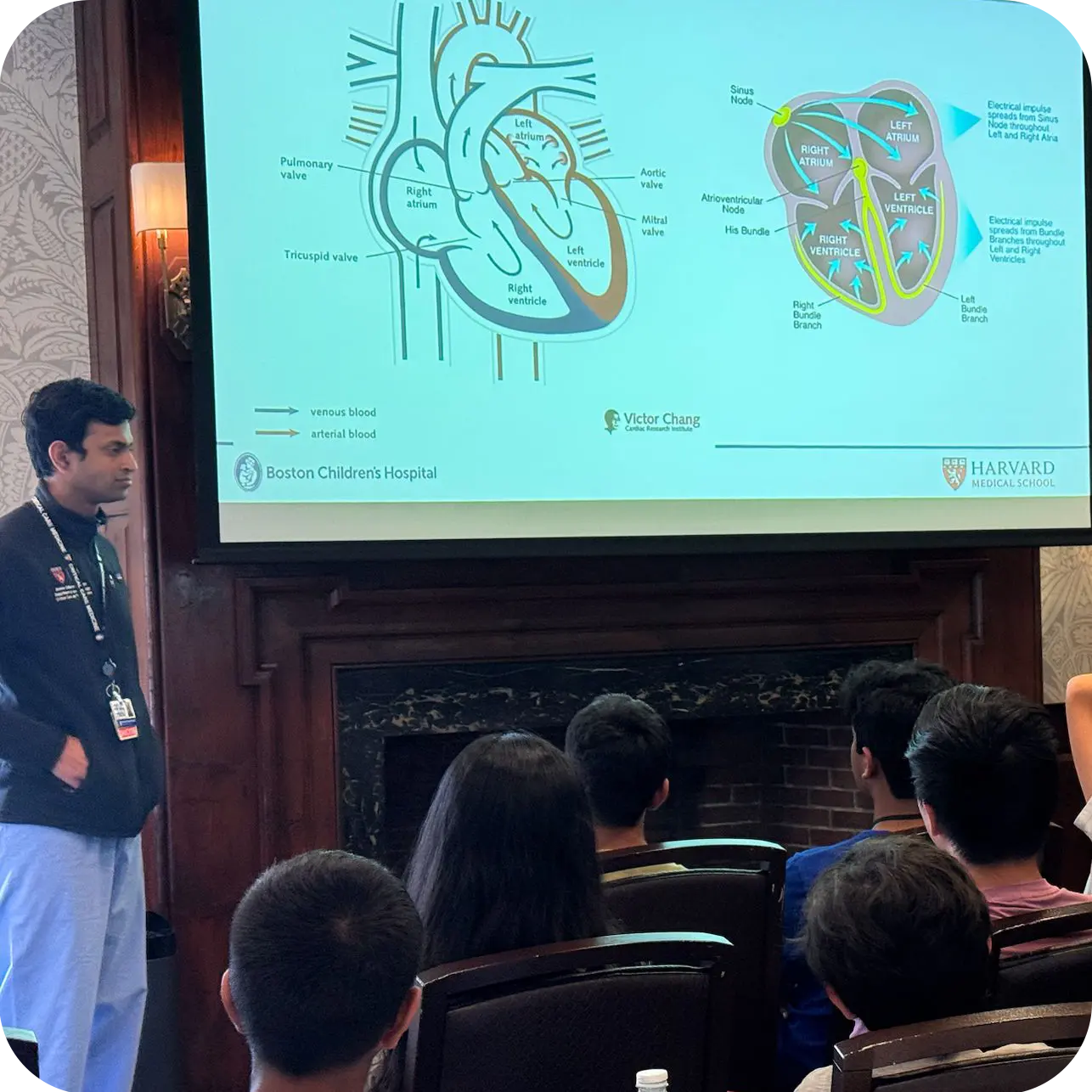
| Date | Morning | Afternoon |
|---|---|---|
| Sat, July 5 | International Students Arrive | |
| Sun, July 6 | Residential Students Arrive Middle School Exam | Orientation and settling into their accommodations High School Exam |
| Mon, July 7 | Opening | Guest Lecture |
| Tue, July 8 | Math Classes | Study Time |
| Wed, July 9 | Math Classes | Study Time |
| Thu, July 10 | Math Classes | Prestigious University Campus Tour, Students’ Forum |
| Fri, July 11 | Math Classes | Prestigious University Campus Tour |
| Sat, July 12 | Boston City Tour for Residential Students | Activities, Field Trips |
| Sun, July 13 | Activities, Field Trips | Activities, Field Trips |
| Mon, July 14 | Math Classes | Study Time |
| Tue, July 15 | Math Classes | Study Time |
| Wed, July 16 | Math Classes | Study Time |
| Thu, July 17 | Math Classes | Study Time |
| Fri, July 18 | Math Classes, Final Exams | Award Ceremony |
| Sat, July 19 | Residential Students Depart |
| Time | Activity | Notes |
|---|---|---|
| 7:15 am – 8:15 am | Breakfast | Residential Students Only |
| 8:15 am – 8:45 am | Day students arrive | |
| 9:00 am – 1:00 pm | Morning Classes | |
| 1:00 pm – 2:00 pm | Lunch and Activity time | Conversation with teachers/counselors |
| 2:00 pm – 4:00 pm | Afternoon Activities | Tests, Competitions, Activities, Trips |
| 4:30 pm – 5:00 pm | Day students depart | |
| 5:00 pm – 6:00 pm | Free time | Residential Students Only* |
| 6:00 pm – 7:15 pm | Dinner | Residential Students Only* |
| 7:30 pm – 9:30 pm | Study Time | Residential Students Only* |
| 9:30 pm – 10:30 pm | Free Time | Residential Students Only |
| 10:45 pm | Lights Out | Residential Students Only |
* Day students who wish to attend supervised evening recreational and academic activities at the residential program may do so for an additional fee. The cost will be $890 (including dinner and all activities).
Airport Pickup
Domestic residential and international students who will be staying with us overnight at our summer math camp are expected to arrive at Boston Logan International Airport or at the camp site between 7 am – 7 pm on (July 5th for International Students and July 6th for Domestic Residential Students). For tuition and fees, please see below.
| Tuition Type | Start Date | Day Student | Residential Student |
|---|---|---|---|
| Early Registration | Up to the end of February | $3.299 | $6799 |
| Late Registration | March | $3.699 | $7199 |
| Super-Late Registration | April | $3.899 | $7499 |
| Final Registration | Up to the end of May | $3.999 | $7699 |
Residential Tuition covers classes & teaching materials, activities, accommodation, meals and in-camp transportation. Payment must be made by the deadlines listed above to benefit from discounts.
Fees
International Students’ Fee: Additional $585.
Airport Pickup/Dropoff fee: $150 each way
Lunch Fee for Day Students: $350 (Day Students might choose to bring their own lunch or purchase lunch at the University.)
Evening Activities Fee for Day Campers: $890 (For day campers who would like to attend our evening study hours and get help from our teachers)
You can save up to $1000 by registering early!
Please fill out the form below to apply. Please provide as much detailed information on the student’s background as possible:
Background Information (not required for returning students): Please provide the student’s background. Please include student’s academic achievements, GPA, any Honors or AP Courses taken, competition experience, any year-round or summer advanced courses/camps that the student has participated in.
We will get back to you with an admission decision and payment details if the student is admitted. All students will take a placement test on the day before the first instructional day of our summer camps, and will be assigned to their appropriate groups according to the results of their exam(s) and the background information provided on their application.
We continuously monitor our students’ progress throughout the camp and make adjustments to their assignments when necessary. If you would like to discuss your child’s placement, please do not hesitate to give us a call or email us at [email protected]
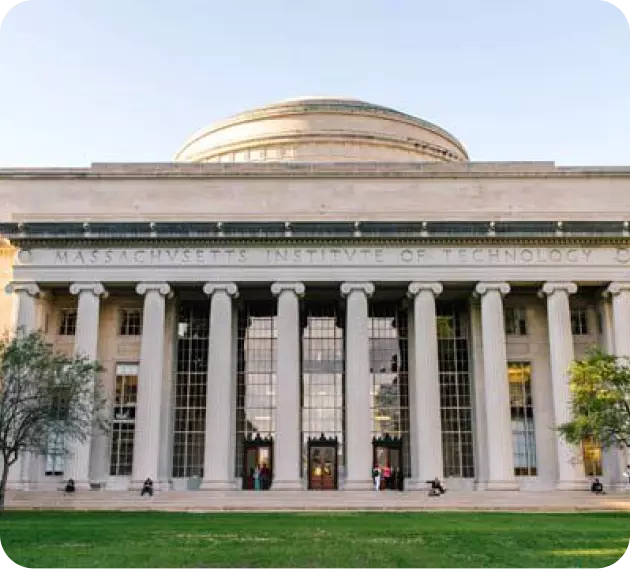
Frequently Asked Questions
- What do CyberMath classes cover?
The Course Catalog page gives a sense of what our classes are like, including areas emphasized, theory/computation/example/application balance, and school math/competition math balance. In previous years, our camps were competition-oriented, and partially intended to help prepare campers for success in math competitions. Beginning in the 2022-2023 school year, we are redesigning our curriculum to be more focused on the broader reasoning and mathematical communication skills that are essential to success in K-12 math, undergraduate-level math, and research-level mathematics, including formal mathematical writing. This might include, for example, mathematical logic and writing exercises (especially writing formal proofs), problems more focused on extending the school math curriculum, time spent on interactive, real-world applications rather than purely theory-based lectures, and/or active engagement projects in the form of having students create their own problems/assessments summarizing what they have learned and extending it to broader concepts. In addition to advanced mathematics, we now offer a dedicated AI & Machine Learning track at both locations, blending cutting-edge computational thinking with hands-on, real-world problem-solving. - Are there any age limits?
We do not have any lower age/grade limits. Students may enroll in Advanced Middle School Math so long as they have not yet started high school (9th grade equivalent and above), and Advanced High School Math so long as they are not yet enrolled at a post-secondary institution. (If you are already in college, we would strongly encourage you to consider applying to teach at our camps!) In past years, we’ve had students as young as 5th grade in our Advanced High School Math camp, and as young as 3rd grade in our Advanced Middle School Math camp. - How do the placement exams work?
Each year, we offer placement exams that are taken in-person at our prestigious academic venues in Boston and Silicon Valley the day before the camp officially begins. The placement tests come in a two-exam series: the first exam is the Middle School Exam, which is meant to reflect the content taught in middle school math courses up to, and including, an 8th grade math course (e.g. pre-algebra), and the second exam is a High School Exam, which is meant to reflect the content in high school math courses up to, and including, Algebra 2 / Integrated Math 3 (but excluding pre-calculus and calculus).Students in 8th grade or below start at a default placement of Middle School Foundations. By scoring well enough on the Middle School Exam, students may qualify for at least the High School Foundations course, and will have the opportunity to take the High School Exam. By also scoring well enough on the High School Exam, students will have the opportunity to place into High School Mastery. High school students (9th-12th grade) may only take the High School Exam, and start at a default placement of High School Foundations; and, by earning a high enough score, can place into High School Mastery.
Examples:
- Alice is a 7th grader, so she starts by taking the Middle School Exam, and scores a 40/100. She will be placed into Middle School Foundations.
- Bob is an 8th grader who takes the Middle School Exam, and scores an 80/100. He will be allowed to take the High School Exam, which will decide his final placement. He then scores a 50/100 on the High School Exam, and he is placed into High School Foundations.
- Carol is a 10th grader, so she will start out at High School Foundations, and take the High School Exam. She scores 90/100, so she places into High School Mastery.
If a student is absent from the exam(s), their default placement will be Middle School Foundations or High School Foundations, as appropriate, barring extenuating circumstances. If a student is found to have cheated on the exam(s), their score(s) will not count, and additional disciplinary action may be taken.
The 2022 exams are provided on the Past Exams page, which will be updated to include future years’ placement exams as well. One can use these as approximate benchmarks to gauge readiness for each of our classes.
- What should I do if I’m not happy with the course in which I was enrolled?
Please contact us at [email protected], or discuss your class placement in person with our Program Coordinator. Our general policy is that students should remain in their assigned courses for at least 3-4 days before we grant a switching of courses; there are exceptions, however, and we consider these on a case-by-case basis. - Does CyberMath Academy provide grades, certificates, or other verification of camp completion?
CyberMath provides letter grades on an A-F scale to each student, along with comments on the student’s performance during the camp and suggestions for future study. These grades are primarily intended for informational purposes; however, please feel free to discuss using them for school credit, placing out of college courses, and/or college admissions with us on a case-by-case basis by emailing us at [email protected].Please note that there is no fixed percentage –> letter grade correspondence; each instructor has the flexibility to decide what levels of performance correspond to which grades. There is also no “curve,” meaning that certain grades do not have fixed percentages of students receiving those grades (e.g. 10% receive an A, 25% receive a B, etc). Grading is purely based on objective understanding of the material. It is entirely possible (and it is our hope) that everyone in our classes will earn an A!
As a general rule, the letter grades assume their standard meanings:
- A = excellent,
- B = good,
- C = fair,
- D = passing,
- F = not quite ready to advance to next level.
Upon request, students may also take our courses under the Passed/Not Passed grading option. Students will receive a grade of Passed (P) if they earn a C- or higher; otherwise, they will receive a grade of Not Passed (NP). Please email [email protected] to file a request to change the grading option. All requests must be submitted before the first day of classes.
We will also provide a Certificate of Completion to every student at the Awards Ceremony, upon completion of the camp. Students who earn a grade of B or higher (not “Passed”) may also be eligible for a Certificate of Mastery.
- Can CyberMath Academy instructors/staff write a letter of recommendation for my student?
Although our faculty are not obligated to write letters of recommendation, we may consider doing so on a case-by-case basis. Please email [email protected] with your student’s name, the class they attended, the year, the instructor, what grade they received, and (if possible) samples of their work during the camp. The instructor and our coordinators will be in contact with you regarding writing a letter of recommendation for them, if it is ultimately deemed to be in the best interest of all involved. (Please note that we reserve the right to decline to write a letter of recommendation.)This will usually entail several different factors, including, but not limited to:
- having received a grade of A- or higher in the class (although there may be exceptions);
- having been an active and respectful participant in class and in camp-wide activities;
- upholding the core values of honor, integrity, and ethicality;
- and otherwise having demonstrated an exceptional level of interest and/or significant involvement in the mathematical community.
We recommend providing at least two weeks’ notice in requesting a recommendation letter; otherwise, we cannot guarantee that the letter can be written on time.
We will strictly comply with FERPA federal law regarding recommendation letters. Unfortunately, this means that certain requests to view a recommendation letter may not be granted.
- Are there any other special requirements for certain classes?
The High School Foundations and High School Mastery math courses have the following prerequisites:- High School Foundations: (Note: this only applies to students in 8th grade or below.) To be eligible to enroll in High School Foundations, students must earn a score of at least 70/100 on the Middle School placement exam (though we will consider borderline scores, depending on the information provided on your application). Alternatively, a grade of B+ or better in Middle School Foundations from a previous year* will also satisfy the prerequisite. Students who have previously taken High School Foundations or High School Mastery are also exempt. We may also consider your math background on a case-by-case basis, and potentially waive these prerequisites. Grounds for waiving the prerequisite include, but are not limited to:
- Receiving a grade of A- or better in a school math course that covers pre-calculus, including trigonometry, logarithms, complex numbers, and conic sections;
- Receiving a score of at least 700 on the Math section of the SAT, or a score of at least 30 on the Math section of the ACT;
- Receiving a score of 5 or higher on the IB Math SL exam;
- Receiving a score of 15 or higher on the AMC 8 contest;
- Receiving a score of 60 or higher on the AMC 10 contest;
- Qualifying for the MATHCOUNTS State Competition, and/or receiving a score of at least 23/46 on the Chapter Competition.
- High School Mastery: To be eligible to enroll in High School Mastery, students must earn a score of at least 70/100 on the High School placement exam (though we will consider borderline scores, depending on the information provided on your application). Alternatively, a grade of B+ or better in High School Foundations from a previous year* will also satisfy the prerequisite. Students who have previously taken High School Mastery are also exempt. We may also consider your math background on a case-by-case basis, and potentially waive these prerequisites. Grounds for waiving the prerequisite include, but are not limited to:
- Receiving a grade of A- or better in a school math course that covers calculus, including limits, derivatives, integrals, and ordinary differential equations;
- Having received a score of at least 750 on the (now defunct) SAT Math Level 2 Subject Test (not Level 1);
- Receiving a score of 3 or higher on the AP Calculus AB or BC exam (incl. AB subscore);
- Receiving a score of 5 or higher on the IB Math HL exam;
- Receiving a score of 90 or higher on the AMC 10 contest, or 75 or higher on the AMC 12 contest.
Note that these are NOT necessary conditions, only sufficient ones! For example, a score of 2 on the AP Calculus AB exam does not preclude you from enrolling in High School Mastery. A score of 3, however, will automatically qualify you for High School Mastery.
* Before 2020, the Middle School Math and High School Math courses were not split into Foundations and Mastery levels. We will consider 2019 Middle School Math to be equivalent to High School Foundations, and 2019 High School Math to be equivalent to High School Mastery. For inquiries regarding classes taken in 2018 and earlier, please email [email protected].
If you are comfortable with proof-based math and/or pre-calculus, it is likely that you will qualify for our High School Mastery course. The High School Mastery course will emphasize mathematical communication and collaboration, so it is strongly encouraged that you bring a computer or tablet to complete projects. It’s also recommended for all students to have some passing familiarity with LaTeX before coming to the camp (but we will spend a considerable amount of time with hands-on LaTeX practice during the camp). Our 2-hour LaTeX workshop (on this page) gives a cursory introduction, but you are encouraged to use the workshop as a starting point and supplement it with your own research and practice with these tools.
- High School Foundations: (Note: this only applies to students in 8th grade or below.) To be eligible to enroll in High School Foundations, students must earn a score of at least 70/100 on the Middle School placement exam (though we will consider borderline scores, depending on the information provided on your application). Alternatively, a grade of B+ or better in Middle School Foundations from a previous year* will also satisfy the prerequisite. Students who have previously taken High School Foundations or High School Mastery are also exempt. We may also consider your math background on a case-by-case basis, and potentially waive these prerequisites. Grounds for waiving the prerequisite include, but are not limited to:
- What is the social atmosphere like?
Our students work together on brain-stretching problems during classes, chat, play sports, and have fun during free time and study hour, and have plenty of opportunities to bond with each other — and our teachers and chaperones — during the outdoor activities and field trips. There’s never a dull moment — our pictures tell all! - What are daily activities outside of classes like?
We’ve had a wide variety of recreational activities like bowling, visits to malls and museums, time with our chaperones, and tours around our camp locations. In Silicon Valley, students enjoy exclusive campus tours at global tech giants such as Google, Apple, NVIDIA, and Meta. See our Info Session slides for more! - Is there an AI & Machine Learning track?
Yes — available at both Boston and Silicon Valley locations. This track integrates advanced computational thinking and real-world AI applications into the math curriculum, offering students a modern, interdisciplinary learning experience. Silicon Valley participants also visit leading tech companies to see AI in action. No prior experience required.